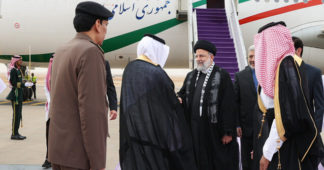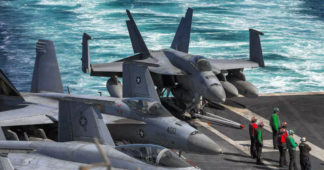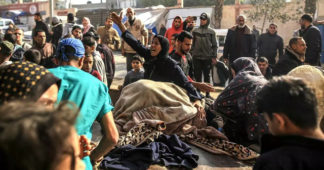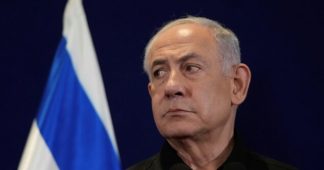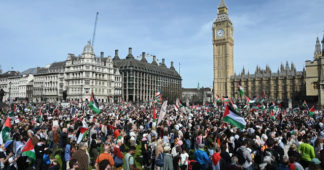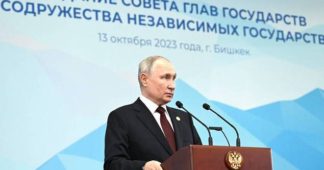Far from driving out Hamas, Gulf peacekeeping force could be ‘cosmetic cover’ for group as it demonstrates staying power
By Sean Mathews
29 July 2024
For over nine months, oil-rich monarchies in the Gulf have deftly manoeuvred to avoid becoming entangled in Israel’s war on Gaza, and the spillover conflicts it has spawned across the region.
Now, some Gulf states appear to be inching closer to entering the conflict’s forefront by participating in a US-backed peacekeeping force in the Gaza Strip when the war ends.
Last week, for the second time in a month, the United Arab Emirates called for a multinational force to deploy to Gaza to provide security after a permanent ceasefire is brokered. The decision represents a remarkable about-face for the UAE, which in May pushed back forcefully against Israel’s claim that it could assist in governing the enclave.
Bahrain, an arch-opponent of Iran, has also signalled privately it will participate in the force, which is likely to see officers and senior non-commissioned officers who are Gulf nationals working on the ground with Palestinian security forces, a US official told Middle East Eye.
If Gulf boots touch the ground in Gaza, it would represent a profound shift for the region, putting the royal families who rule the Gulf in uncharted territory.
The monarchs have spent decades brushing aside the Israel-Palestine conflict to focus on intervention in poorer Arab states like Libya, Syria and Yemen – but more recently, have focused on economic growth at home.
But the Hamas-led 7 October attacks and Israel’s subsequent bloody offensive on Gaza have jolted the Gulf states back into the Palestine-Israel arena, much like it has the US, analysts say.
“Saudi Arabia was not interested in the internal political arrangements of how a Palestinian state was to be governed [before 7 October],” Yasmeen Farouq, a Gulf expert at the Carnegie Endowment for International Peace, said at a virtual event hosted by Chatham House on Thursday.
“Now Saudi Arabia is interested in the details.”
‘Cost-free’ way to make friends in Washington
The UAE and Bahrain are also chalking up diplomatic points in Washington by promising to participate in a peacekeeping force, underscoring their importance as partners to the US and Israel. But with the conflict still raging, they have very little skin in the game at the moment.
“This is a lever to get the Israelis to agree to a ceasefire. The Gulf states are not stupid enough to send soldiers into Gaza to fight Hamas or give cover for Israel to do so,” Patrick Theros, a former US ambassador to Qatar, told MEE. “In the meantime, it’s a cost-free way to make friends in Washington.”
Gulf states were flexing their independence from the US before 7 October. Israel’s war on Gaza has given them another opportunity to be courted by Washington.
Saudi Arabia is holding out the promise of normalisation with Israel to elicit more foreign military sales, a defence treaty and nuclear energy cooperation. Those talks appear stalled as the US gears up for 2024 elections, but will likely be high on the agenda for both a new Republican or Democratic administration.
The UAE is a key counter-terror partner for the US, but the relationship has soured over US allegations that Russia is using Dubai to evade western sanctions and that it is too close to China on tech and military cooperation. The Biden administration halted the sale of F-35s to the UAE, citing concerns about China.
Incentives
Of course, Israel’s war on Gaza is not occurring in a vacuum. Diplomats and intelligence chiefs are still cutting deals on other fronts.
For example, talks on a peacekeeping force coincide with discussions between the UAE and the US over who will foot the bill for sustainment upgrades to Al Dhafra air base, which is home to the US’s 380th Air Expeditionary Wing, a current senior US official who chose to remain anonymous told MEE.
For its part, Qatar negotiated a new 10-year agreement to extend the US’s military presence at Al-Udeid base, as it mediates between Hamas and Israel. Even tiny Bahrain, home to the US fifth fleet, has a wishlist for Washington. In 2020, it was slapped with aluminium tariffs.
“The Gulf states are scoring goodwill in Washington,” David Schenker, a former senior US official now at the Washington Institute for Near East Policy, told MEE.
“Bahrain didn’t get anything material out of the Abraham Accords and the UAE lost out on the F-35 deal,” he added.
The current senior US official put it more bluntly. “Washington has to provide incentives to join a peacekeeping force. That is how the Gulf states think”.
The Gulf states are also gaining leverage with Israel and the US to craft a post-war reality in the Gaza Strip that they hope protects their interests.
The UAE has been the most public about the discussions – setting terms that include a ceasefire, the easing of Israel’s blockade on the Gaza Strip, and an invitation to deploy troops from a reformed Palestinian Authority.
The last pre-condition points to the UAE’s wider ambitions. Abu Dhabi is hard at work pushing to ensure that the body governing the Gaza Strip reflects its outlook.
MEE reported that the UAE aims to form a national committee of Palestinian leaders and business figures loyal to exiled former Fatah leader and Palestinian strongman Mohammed Dahlan to govern Gaza. The UAE hopes that Dahlan could succeed ageing Palestinian Authority President Mahmoud Abbas.
Competition
While the UAE takes the lead in calling for a peacekeeping force, Saudi Arabia has reaffirmed the importance of a two-state solution.
The kingdom’s Foreign Minister Faisal bin Farhan gave a rousing defence of this position in May, saying: “Israel doesn’t get to decide whether or not the Palestinians get a right to self-determination.”
“There is some degree of competition emerging among Saudi Arabia, the UAE, and Qatar,” Schenker, told MEE.
The differences go back to divides that threw the Gulf into tumult in the wake of the Arab Spring.
Since 2006, Gaza has been governed by Hamas, a Palestinian Islamist and nationalist group with roots in the Muslim Brotherhood. For more than a decade, Qatar has been willing to host Hamas’s political leaders at the request of the US. It has also championed the Palestinian cause on its state-owned Al Jazeera News and led Gulf states in providing aid to besieged Palestinians in Gaza.
Qatar’s outspoken support for Palestine has contrasted sharply with the UAE and Bahrain’s later decisions to normalise ties with Israel under the US-backed Abraham Accords.
The UAE, Saudi Arabia and Bahrain have also been hostile to Hamas because of its Muslim Brotherhood roots, which they consider a threat to their rule. The three previously blockaded Qatar over its alleged ties to the Muslim Brotherhood, among a host of other reasons.
Saudi Arabia and Qatar have since patched up ties. Before 7 October, Riyadh even hosted senior Hamas leaders Ismail Haniyeh and Khaled Mashaal. The visit coincided with a resumption of diplomatic ties with Iran, which is a backer of Hamas. But relations between the UAE and Qatar remain frosty. The former is also competing with Saudi Arabia for influence in Yemen and Sudan.
“For the UAE, being the dominant player in Gaza’s day-after means they can push Qatar out of the Palestinian arena,” Michael Milshtein, the former head of Palestinian affairs in Israel’s military intelligence, told MEE. “The UAE wants to change the very DNA of the Palestinian arena, but they aren’t naive.”
Despite lingering tensions, the Middle East of 2024 is not the same region it was during the Arab Spring when Gulf powers were competing over the very nature of governance. Today, Saudi Arabia, Qatar, and the UAE are all trying to diversify their economies away from their dependence on energy.
“The claim that the Gulf is afraid of a vacuum in Gaza and Hamas coming back to govern is a totally exaggerated fear in the West and Israel,” Theros said. “The bigger fear among rulers is their peoples’ anger about Israel bombing Palestinians.”
Parallels with Hezbollah
Gulf royals watched Israel pummel the Gaza Strip for months, only to see Hamas reemerge from the rubble and launch spectacular guerrilla-style attacks against Israel. Far from sidelining Hamas, what is happening among power brokers and intelligence chiefs in the Gulf may be an acceptance of Hamas, experts say.
“The Israeli and Gulf narratives about peacekeepers are very different,” Bader al-Saif, a professor at Kuwait University, told MEE. “The Gulf states know they’ll play a central role in reconstructing Gaza and that’s why the Gulf states ought to play a more forceful role in the day after to arrive at a permanent resolution in coordination with the Palestinians and international community”.
Saif said that Gulf rulers know Hamas is not going anywhere and will engage with the group on “clear rules of engagement” if they send peacekeepers.
Hamas has publicly rejected the presence of any international force in Gaza but says it will support a unity Palestinian government in Gaza. Last week, the group agreed to form a unity government with Fatah, the main secular political party in the PA, in a deal brokered by China.
For the UAE, one of the advantages of former Fatah leader Dahlan is that he has some ties to Hamas officials. One Palestinian analyst, who spoke to MEE on the condition of anonymity, said that Hamas may see it in its interests to allow an Arab peacekeeping force into Gaza.
“The Gaza Strip has been obliterated by Israel. Hamas has no interest in cleaning up the devastation Israel caused. They need to maintain their influence but not govern. Hamas will be more receptive to peacekeepers than the Palestinian Authority under Abbas,” the analyst said.
Hamas says it has no plans to disarm fighters in its al-Qassam Brigades, and officials familiar with the talks on a peacekeeping force say the UAE and Bahrain have laid out no plans to disarm the group.
“Gaza is going to Hamas 2.0,” a senior US official told MEE. “Hamas will become something like Hezbollah, an armed actor outside of government that can blame the government for its failures.”
Milshtein agreed.
“People who talk about a power vacuum in Gaza are delusional. Hamas is the dominant power in Gaza. Even if peacekeepers go in, they will be a cosmetic cover for Hamas.”
We remind our readers that publication of articles on our site does not mean that we agree with what is written. Our policy is to publish anything which we consider of interest, so as to assist our readers in forming their opinions. Sometimes we even publish articles with which we totally disagree, since we believe it is important for our readers to be informed on as wide a spectrum of views as possible.
